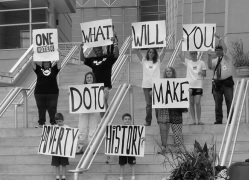 Photo by William Iven on Unsplash Photo by William Iven on Unsplash You are a nonprofit executive. You eat lunch at your desk regularly, 50 hours a week is a "short" week, and you're understaffed. You are the head of human resources, lead fundraiser, and mentor to a team of young idealists. You don't have time to become an expert in social media, but you don't have to be. Here are five tips for faking it. 1. Have a communications plan. This plan does not have to be complicated. It could be as simple as, "We will post to Facebook three times a week to share upcoming events, recent successes, fundraisers, or interesting news articles our supporters will appreciate." Although I recommend something more complex, if you have NO strategy, simple is better than nothing. This is the template I use with my clients and will help you and your team determine your social media goals.
0 Comments
I have been lucky enough to work with community organizers and politicians throughout the Midwest, as well as in the Balkans, Afghanistan, and South Sudan. As a result, I have helped craft and implement to a wide variety of community development initiatives from the “usual” (building roads and schools, providing health care, fostering employment opportunities for youth) to the “surreal” (addressing python infestation currently tops the list). Part of the process in developing countries is teaching people about key principles for civic education and engagement, which is something Americans all know about, but we sometimes forget. The Chicago Tribune recently asked readers to submit ideas about a plan for Chicago, and while drafting my plan to address crime and violence, I put together some ideas about civic engagement and government, and how we can re-engage in city decision-making.
 Organizing against poverty. Chicago, 2007. Organizing against poverty. Chicago, 2007. September 15th is the International Day of Democracy. If you didn’t know that, don't fret, I consider myself a democracy nerd and I didn't know. But, having spent the better part of my career working in new democracies, I thought it would be a good occasion to give credit to Chicago, the place that taught me about democracy. The more cynical among you are expecting jokes about voting “early and often”, political dynasties, or corruption in general. But that is not what I see as the roots of Chicago politics. Chicago politics boils down to three important tenants: politics is local, organizations are about people, and communication is key. This holds true at a community meeting about the local park or at a city council, and yes, it even holds true when politicians are using them to benefit the Machine |
annisa's blogIncludes professional topics, as well as thoughts about politics. I also keep a blog on Medium that includes these, as well as more personal posts. archives
January 2020
categories
All
|

 RSS Feed
RSS Feed